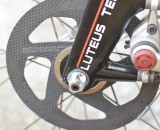Two years ago, this statement from USA Cycling was met with mixed reactions from the cyclocross community:
“Following the recommendation of the Cyclo-cross Commission, the UCI Management Committee has approved modifications to its cyclo-cross rules which will take effect at the beginning of the 2010-2011 cyclo-cross season. A summary of the changes is as follows: 1) Disc brakes will now be allowed in cyclo-cross competition.”
Now, two seasons and millions of dollars worth of development later, it seems as though the UCI is beginning to backtrack, perhaps longing for those days when cyclocross was a simple race in muddy farm fields in Belgium, not a race of elaborate rituals, team trailers and (gasp) trips to the US for even the highest ranking Euros.
With developments coming out all of this year with regards to disc brakes, including Kettle Cycles SFL SiCCC disc rotors, which have been consistently coming down in size, we’re willing to bet that the UCI will be in for some serious criticism from companies, teams and racers. Many companies now find themselves in a difficult position, with SRAM, Shimano and TRP very close to unveiling new hydraulic disc brake systems for road and cyclocross (tune into our 2013 Sea Otter coverage later this month for full details on the new systems).
The UCI has been known to flip-flop on issues: disc brakes were legal and all the rage in the early 2000s, but since then, have been banned, and most recently, re-introduced to elite racing.
Citing reasons such as rider inequality — most women’s teams still haven’t made the expensive switch to discs — and the expense to properly outfit a junior development team, the UCI is willing to admit that they made a mistake. They’re also lamenting the disastrous consequences of weight weenie bloggers pushing cyclocross brake systems beyond their limit.
However, the top reason that the governing body cited was the low adoption rate, as seen at the 2013 World Championships. “We were surprised that racers didn’t jump at the opportunity for superior braking despite weight gains,” one official told us, off the record.
“We made a mistake, we really thought these racers would want to slow down,” he paused, confused. “Who knew all they cared about was going faster?”
As a result, the UCI is urging governing bodies like USA Cycling to re-establish rules banning disc brakes in non-UCI races. And they announced today that for 2014, a rule re-banning the brakes will be in full effect.
We previously went over some of the pros and cons of disc brakes, back when the original debate was raging. “Many of the reasons given for not using disc brakes – weight penalty, overkill for road and cyclocross racing – have less to do with using disc brakes than using brakes designed for mountain bikes. There’s no way around it, discs will always weigh more than canti’s. But they don’t have to weigh as much as they do now. When it comes to using disc brakes with road levers there’s very little selection. Last time I checked the number of mechanical disc brakes designed for use with road levers was two: the road version of the venerable Avid BB-7 and Tektro’s Lyra.”
And when the decision first was handed down to allow disc brakes in UCI races, some racers were displeased. We wrote, “Several riders from the professional ranks expressed their disappointment that the UCI was abandoning a decision that has kept ’cross rooted to a long tradition for years. On Twitter Adam Myerson, a former member of the UCI Cyclocross Commission, wrote, ‘Disc brakes are for mountain bikes and motorcycles. Not cyclo-cross bikes.'”
Luckily, the change won’t impact most of the Euro teams, including the key players like Niels Albert and Sven Nys, who never made the shift to disc brakes. It’s primarily large American teams like Rapha-Focus and Cannondale-CyclocrossWorld, along with a whole host of masters racers, who will be potentially hurt by this decision.
But don’t fret if you’ve already bought a bike for 2013. The ban won’t go into place until next season, though how it will impact Nationals and Worlds (both in 2014) is debatable. “We’ll give them one year to switch back,” one official is reported as saying. “And that’s being generous.”
[Ed. note: This was one of a handful of stories posted on April 1 for a little April Fools’ fun.]





























